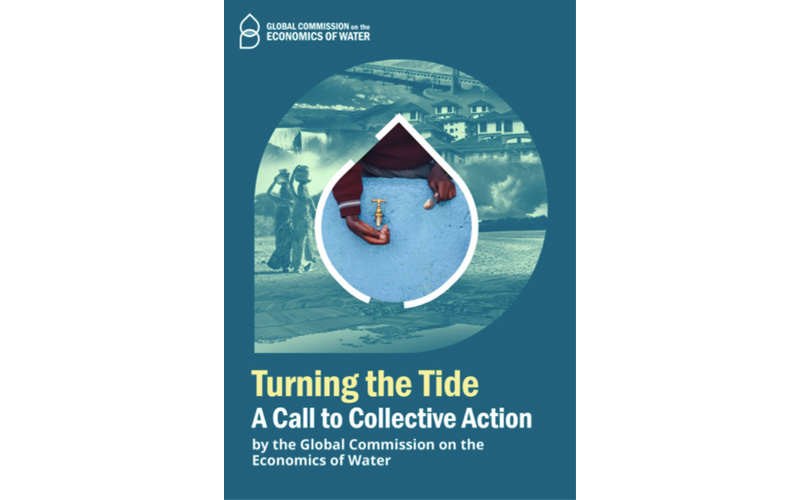The Economics of Water
 What is the work of the Global Commission on the Economics of Water focus on? What challenges is it addressing?
What is the work of the Global Commission on the Economics of Water focus on? What challenges is it addressing?

For the first time in history, human activity and practices have put the global water cycle, on which all life depends, on an unsustainable course. The science also shows how communities and nations are hydrologically intertwined through not just surface water but also atmospheric moisture flows.
The global water crisis will endanger all the Sustainable Development Goals, making them virtually impossible to achieve. It will imperil food and health security, exacerbate poverty, and peace within and between nations. It will disproportionately affect women, vulnerable and marginalised groups among indigenous communities, youth, farmers, workers and small and medium-sized businesses.
Our work with the Global Commission on the Economics of Water

All our current arrangements and economic thinking rest on the assumption, that the local and regional supply of water is relatively stable, predictable and manageable. This is no longer true. Humanity is now in the midst of a global water crisis, around which the cost of inaction is unbearable, for both the Global North and the Global South.
The Global Commission on the Economics of water is tasked to properly define, value, and govern water as a global common good, based on a better understanding of the links between water, economic development, climate change and biodiversity loss. Thinking about water in this way will allow us to mobilise urgent collective action and design new rules that put equity and justice at the centre of our response to both a local and a global emergency.
Why is it key for our work on the green economy?
As water is integral to achieving most of the sustainable development challenges, such as combating climate change, poverty reduction, and inclusive growth, sustainable livelihoods, it can catalyse a new development model based on more equitable premises and better stewardship of nature. Rethinking our relationship with water is crucial to our green economy transformation as it makes a case for promoting green and blue innovation and finance and reimagining the state's role in shaping markets along with central banks and financial regulators.
- Academic journal papers
- Rockström, J., Mazzucato, M., Andersen, L. S., Fahrländer, S. F., & Gerten, D. (2023). Why we need a new economics for water as a common good. Nature, 615.
- Q&A with Mariana Mazzucato and others at Nature Water/ Sjöstrand, K. Water for sustainable development. Nat Water 1, 568–572 (2023). https://doi.org/10.1038/s44221-023-00108-2
- Policy briefs and reports
- Mazzucato, M., N. Okonjo-Iweala, J. Rockström and T. Shanmugaratnam (2023), Turning the Tide: A Call to Collective Action, Global Commission on the Economics of Water, Paris. https://watercommission.org/wp-content/uploads/2023/03/Turning-the-Tide-Report-Web.pdf
- GCEW (2023), The What, Why and How of the World Water Crisis: Global Commission on the Economics of Water Phase 1 Review and Findings, Global https://watercommission.org/wp-content/uploads/2023/03/Why-What-How-of-Water-Crisis-Web.pdf
- Working papes
- Mazzucato, M. (2023). A collective response to our global challenges: a common good and “market-shaping” approach. https://www.ucl.ac.uk/bartlett/public-purpose/publications/working-papers.
- Events
- Press conference, the UN 2023 Water Conference, the four Co-Chairs of the Commission present the key findings of the GCEW to date and responded to journalists’ questions. https://youtu.be/_qoNv5Insgw, other link for the GCEW website (with full details) https://watercommission.org/event/press-conference-turning-the-tide-call-to-collective-action/
- The UN 2023 Water Conference, Official Side Event led by the GCEW – Turning the Tide: A Call to Collective Action by the Global Commission on the Economics of Water https://youtu.be/Vssr-d4mcH4, other link from the GCEW website (with full details) https://watercommission.org/event/side-event-turning-the-tide-call-to-collective-action/
- Regional Water Dialogues in Latin America and the Caribbean 2023- Participation of Mariana Mazzucato in the opening plenary session provided an introduction and welcoming remarks for the event. https://youtu.be/OsP4IjYV3uY other link from the GCEW website (with full details) https://watercommission.org/event/regional-water-dialogues-in-latin-america-and-the-caribbean-2023/
- Events - retreats
- First in-person meeting of the GCEW (In Geneva – May 2022) https://watercommission.org/event/first-in-person-meeting-of-the-gcew/
- Second in-person meeting of the GCEW (Organised by IIPP – Sept 2022) https://watercommission.org/event/second-in-person-meeting-of-the-gcew/
- Third in-person meeting of the GCEW (In Potsdam – Dec 2022) https://watercommission.org/event/third-in-person-meeting-of-the-gcew/
- Forth in-person meeting of the GCEW (In Geneva – July 2023) https://www.flickr.com/photos/water-commission/albums/72177720309651815
- Blogs
- The Bartlett Review 2023: To stop water crises, the world must value water as a global common good. Prof Mariana Mazzucato, Dr Virgi Sari https://2022.thebartlettreview.com/stories/stop-water-crises-world-must-value-water-global-common-goo
- Media
- Article | Confronting the Global Water CrisisConfronting the Global Water Crisis | Project-Syndicate | Mariana Mazzucato, Ngozi Okonjo-Iweala, Johan Rockström and Tharman Shanmugaratnam
- Interview | Global fresh water demand will outstrip supply by 40% by 2030, say experts | Guardian | Mariana Mazzucato and Johan Rockström
- Interview | "Keinen Tropfen mehr zu verschenken" ("Not a drop left to give away") | Zeit | Mariana Mazzucato
Contact
Dr Mariam Zaqout, Postdoctoral Researcher (Economics of Water)
Email: m.zaqout@ucl.ac.uk
 Close
Close

